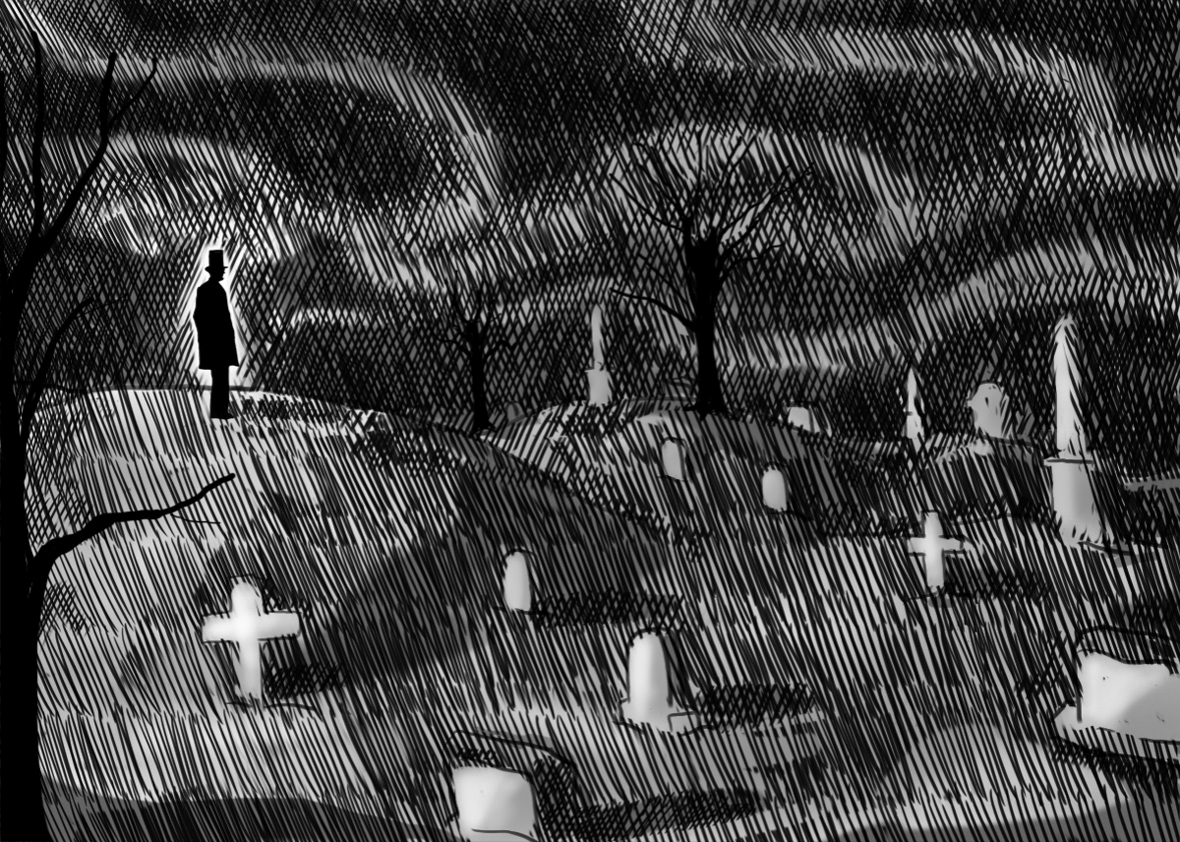
Slate is an Amazon affiliate and may receive a commission from purchases you make through our links.
The Beautiful World
George Saunders’ first novel is lovely, moving, and fundamentally the wrong book for this moment in history.

Adi Embers
George Saunders’ Tenth of December, his fourth short story collection, was published to much fanfare in 2013. The centerpiece of the ballyhoo was a New York Times Magazine profile pronouncing it “the best book you’ll read all year,” and the public responded by making Tenth of December the rare literary story collection to land on the best-seller list. For anyone who’d been following Saunders’ work since 1992, when his groundbreaking story “CivilWarLand in Bad Decline”—set in a theme park degenerating into dystopia under callous management—appeared in the Kenyon Review, the acclaim, however tardy, has been welcome. And yet there were detectable mutterings underneath it all. Some reviewers, while praising Tenth of December, noted that Saunders’ satirical glosses on life under corporate capitalism are a bit obvious, or that for all the originality of his voice, his work hasn’t evolved much over the years.
What a difference a few years and a catastrophic presidential election make! The particular flavor of Saunders’ fiction combines pathos with a submerged but fiercely sardonic humor. His characters are typically pitiable—hirelings and underdogs, experimental subjects and neglected children, the cowed members of families and workplaces dominated by unchecked malignant narcissists—but each one harbors a tiny flame of decency that remains stubbornly lit despite the humiliations and disappointments heaped upon him. They cling to false comforts, flimsy self-help nostrums, and dreams corrupted by marketing kitsch (“When will I have sufficient leisure/wealth to sit on hay bale watching moon rise, while in luxurious mansion family sleeps? At that time, will have chance to reflect deeply on meaning of life, etc., etc.”), but it is the clinging itself, and their refusal to jettison their own nagging consciences, that makes them heroic. You could argue, as some have, that the accentuated irony in Saunders’ fiction, the gap between how the characters view their plight and how the reader perceives it, flatters his audience’s superior understanding. But I’ve always suspected that Saunders regards such knowingness as merely a more sophisticated mirage: Just because you’ve clocked how power and consumer capitalism operate doesn’t make you any less their bitch.
Now comes Saunders’ long-awaited first novel, just at the moment when his capacity to hold onto that slender thread of humanity running through the direst social circumstances seems most needed. And it is … a historical novel. About grief. And Abraham Lincoln. It’s not that Lincoln in the Bardo isn’t worthwhile. It has many moments of power, and even passages of the sort of lushly sensual prose that hasn’t previously been a Saunders specialty. It definitely marks an advance into new formal territory. It’s just that the timing on this thing is really, really bad. A George Saunders novel seems like just what we need right now, but chances are Lincoln in the Bardo is not the George Saunders novel you’re looking for.
Lincoln in the Bardo is set in a Washington cemetery in 1862, amid the resident population of ghosts. Using a format that combines a playlike assemblage of voices alternating with chapters composed of quotations from historical sources, it depicts how the ghosts respond to the arrival of Willie Lincoln, the president’s son, who died of typhoid at age 11. Lincoln himself appears, the night after his son’s funeral, pulling the dead boy’s body out of its coffin to embrace it. This causes a sensation in the cemetery because, as one of the spirits puts it, “to be touched so lovingly, so fondly, as if one were still … worthy of affection and respect? It was cheering. It gave us hope.”
Those ghosts who linger in the graveyard do so because they can’t relinquish some attachment to what they refer to as “the previous place”: three daughters left in the care of a loathed husband; a lifetime’s worth of jealously hoarded possessions; a body of unpublished scholarly work demonstrating the author’s “genius.” The two primary speakers are a frustrated bridegroom, felled by a building collapse just before his marriage could be consummated, and a young man who killed himself in despair over his homosexuality only to regret the loss of the beautiful world when it was too late. The bridegroom appears to other specters with an enormous erection; the suicide appears as a freakish vision with multiple noses and sets of eyes, rhapsodizing about the glories of the senses: “…the peach orchards and haystacks and young girls and ancient wild meadows drove him nearly mad with their beauty, and strange animals moved in lazy mobs along muddy rivers, rivers crossable only with the aid of some old rowing hermit who spoke a language barely English, and all of it, all of that bounty, was for everyone, for everyone to use, seemingly put here to teach a man to be free.”
Most of these ghosts refuse to acknowledge that they’re dead and clutch at the hope that they can somehow communicate with, and affect, those still residing in “the previous place.” They are subjected to visitations from radiant beings who try to persuade them to “go on,” promising them paradise in the next place, but the revenants shun these demonic tempters and regard the ghosts who succumb, leaving the cemetery forever, with pity. The longer the ghosts remain, the more diminished they become, reduced to tiny forms symbolic of the desires they can’t relinquish.
The bardo is an element of Tibetan Buddhism, a way station between incarnations in which souls prepare themselves for their next life. The novel’s title, and the role of attachment in detaining the spirits in their limbolike semi-existence, suggests an underlying Buddhist cosmology. But one of the ghosts, a former reverend, claims to have glimpsed beyond this world a place of terrible judgment and punishment, so it’s possible that Saunders means the afterlife to be a reflection of whatever the individual soul expects to see. One thing is certain: The ghosts of children who tarry in the cemetery are in great peril, subject to a horrific transformation in which they become encased in a carapace of tiny, teeming, angry souls (a scenario with an unsettling resemblance to the body thetans of Scientology doctrine).
Why this should be the case, nobody knows. Jaded readers may suspect that Saunders needed to contrive a selfless cause—saving Willie—to unite all the ghosts in a group effort, thereby providing a plot and the opportunity for redemption in community. The metaphysical apparatus must be explained to some extent, and those explanations are both a bit tedious and at odds with the moral center of the book, which is the grief of Lincoln.
Lincoln was a great man, and the loss of a child is a shattering blow to absorb—especially if you also happen to be a leader of conscience aware that your decisions will cost other parents their own sons. As for the ghosts themselves, they persist in a suspended state familiar to any reader of Samuel Beckett, a condition only slightly more existentially pointless than that occupied by the living. The subjects of loss and mortal regret are momentous ones, which probably explains why (to the browsing critic, at least) seemingly every other literary novel is about grief. Anyone can write a “serious” novel when they choose such serious themes, which is why, in addition to the great ones, so many mediocre writers with nothing especially interesting to say are drawn to them.
Very few writers, however, can write about the crap we actually live with—theme parks and lawn ornaments and customer service reps and petty autocrats—in a way that teases out the desperation and cruelty lurking within. Fewer still can also make you laugh while they’re doing it. I can think of only one who can consistently persuade his readers that some of our essential humanity will survive the assault of all that banality. That Saunders might have something enlightening to say about our age of ambient rage occurred to the editors of the New Yorker, who sent him off to a few Trump rallies last year, severely testing the author’s capacity for empathy. (He passed.) The result, currently a finalist for a National Magazine Award in feature writing, observes that “the tragedy of the Trump movement is that one set of struggling people has been pitted against other groups of struggling people by someone who has known little struggle, at least in the material sense, and hence seems to have little empathy for anyone struggling, and even to consider struggling a symptom of weakness.” A Saundersian scenario if I’ve ever heard one.
Novels take a long time to write and publish, and no doubt this one was finished before the American polity took a four-year detour through the kingdom of the grotesque. Every day brings a new, preposterous travesty. Can anyone doubt that the inner monologue of Sean Spicer, under orders to parrot and defend the manifest falsehoods embraced by his delusional boss as he stands squirming like a bug under the gaze the nation’s press, would sound exactly like a George Saunders story? An early Saunders story, that is, not the melancholy, inward-looking, often lovely and moving but fundamentally private novel that is Lincoln in the Bardo. Saunders is a writer whose satire has long seemed a bit too monstrous for mainstream success, yet now that he has published what is surely his most gently accessible work, reality has abruptly caught up to his darkest visions.
Now more than ever, we occupy a bizarre, artificial, demoralizing, and terrifying world, and George Saunders might just be the only writer able to do justice to it. I can’t help hoping he’ll come back to it soon.
---
Lincoln in the Bardo by George Saunders. Random House.
Read the rest of the pieces in the Slate Book Review.
Lincoln in the Bardo: A Novel
Check out this great listen on Audible.com. The long-awaited first novel from the author of Tenth of December: a moving and original father-son story featuring none other than Abraham Lincoln, as well as an unforgettable cast of supporting characters, living and dead, historical and invented. Fe...

